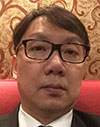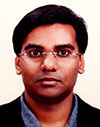Asst. Prof. Greg Adamson, Enterprise Fellow in Cyber Security at the University of Melbourne School of Engineering
 Asst. Prof. Greg Adamson is Enterprise Fellow in Cyber Security at the University of Melbourne School of Engineering. He has worked with Internet technologies since 1991. He chairs an IEEE activity on Digital Inclusion through Trust and Agency, which seeks to draw together specialists and volunteers in the area of digital identity. He is also on the Standards Australia Blockchain and Distributed Ledger technical committee, and the Board of Directors of Internet Australia.
Asst. Prof. Greg Adamson is Enterprise Fellow in Cyber Security at the University of Melbourne School of Engineering. He has worked with Internet technologies since 1991. He chairs an IEEE activity on Digital Inclusion through Trust and Agency, which seeks to draw together specialists and volunteers in the area of digital identity. He is also on the Standards Australia Blockchain and Distributed Ledger technical committee, and the Board of Directors of Internet Australia.
Presentation: IoT, Blockchain, and principles of Identity
A founding characteristic of the Internet was the inability to determine who you are communicating with, captured in the 1993 meme “On the Internet nobody knows you’re a dog”. Before an adequate solution to this emerged, the challenge had broadened to machine-to-machine and then thing-to-thing communications. Today we have no agreed, sufficient, comprehensive, respectful solution in place, creating challenges for security, and also for dignity. This presentation will examine factors that make this challenge unique to the Internet, conditions which must be met to achieve broad if not universal adoption of any solution, and a selection of the many initiatives currently underway.
Igor Chugunov, CEO & Founder CREDITS blockchain Platform
 12 years in business, including IT fintech projects, bank and credit e-services, affiliate marketing company for banks and PDL companies. Two years experience with blockchain business. Working with CREDITS platform since 2016. Igor’s Linkedin profile https://www.linkedin.com/in/chugunov-igor/
12 years in business, including IT fintech projects, bank and credit e-services, affiliate marketing company for banks and PDL companies. Two years experience with blockchain business. Working with CREDITS platform since 2016. Igor’s Linkedin profile https://www.linkedin.com/in/chugunov-igor/
Presentation: CREDITS- A new Blockchain Generation
CREDITS is an open blockchain platform with autonomous smart contracts and an internal cryptocurrency. The platform is designed to create services for blockchain systems using self-executing smart contracts and public data registry. CREDITS platform is the first completely autonomous blockchain system. The platform offers a new, extended application programming interface (API) that utilizes a Turing system capable of creating services using cycles, schedules, and unique functions. No other platform offers smart contract execution speeds near those of CREDITS. We believe that blockchain technology is suitable for financial and loan services, trade, medicine, identification, exchanges, Internet of things (IoT) services, and many other applications, some of which cannot yet be imagined. CREDITS unique blockchain technology offers paradigm-shifting capabilities to industries, applications, and users who require unmatched scalability. The addressable market for these services is estimated to be worth trillions of dollars.
Raymond E. Cline, Jr., PhD, Chief Mining Officer
 Dr. Cline is currently responsible the cryptocurrency strategy and initiatives for Lancium. Dr. Cline serves as a member of the IEEE Blockchain Initiative Steering Committee and is President/CEO of RWI Mining, LLC, a Blockchain mining firm.
Dr. Cline is currently responsible the cryptocurrency strategy and initiatives for Lancium. Dr. Cline serves as a member of the IEEE Blockchain Initiative Steering Committee and is President/CEO of RWI Mining, LLC, a Blockchain mining firm.
He has participated in the development of a broad range of technologies, including high performance computing and communications technology, distance computing, collaborative computing, parallel processing, distributed computing, distributed object computing, distributed multimedia, networking protocols, and Asynchronous Transfer Mode (ATM) networking.
Dr. Cline serves on the board of HARC, a research hub…View full bio
Presentation: Lancium – Addressing Challenges in Infrastructure
Lancium is working to solve two of the most prominent problems in the emerging technology space at this time. Global demand for electric power and the desire to meet this demand with “greener” generation has driven down the cost and greatly increased the deployment of renewable energy generation. The increase in renewable generation has produced in some geographies greater instabilities and resulted in increases in energy waste. Simultaneously, block chain, IoT, and general information technology infrastructure are requiring a tremendous amount of energy, at an increasing rate. Dr. Cline will present Lancium’s approach to providing infrastructure solutions that balance both the needs of an increasing deployment of distributed renewable generation and providing needed capacity for block chain, IoT, information technology, and other energy demanding endeavors.
Dr. Patrick Hung, Co-founder & CEO of Velosti Technology
 Dr. Patrick Hung is co-founder and CEO of Velosti Technology, a fabless semiconductor IC design house. Before founding Velosti Technology, he was Consulting Assistant Professor at Stanford University. Dr. Hung received Ph.D degree in Electrical Engineering from Stanford University and B.Sc. degree in Electrical Engineering from University of Hong Kong. He is Taishan Scholar in China and was CBI Overseas Scholar in UK.
Dr. Patrick Hung is co-founder and CEO of Velosti Technology, a fabless semiconductor IC design house. Before founding Velosti Technology, he was Consulting Assistant Professor at Stanford University. Dr. Hung received Ph.D degree in Electrical Engineering from Stanford University and B.Sc. degree in Electrical Engineering from University of Hong Kong. He is Taishan Scholar in China and was CBI Overseas Scholar in UK.
Presentation: Secure IoT Cloud Sharing with Blockchain Technology
Storage clouds are a very efficient and convenient means to store information for many IoT applications. For example, home monitoring system may store real time video data on storage clouds. The video data are constantly analysed by Artificial Intelligence cloud, issuing alerts if there is any burglary or accident at home. Yet, our cloud data are not completely private and might be accessed by cloud providers, foreign government agencies, malicious hackers and competition. This can create very serious security and privacy issues in the future.
In this talk, we will present an efficient and flexible secure storage cloud sharing scheme. The private data are encrypted on the device side using high-performance USB 3.1 hardware chip. Each data stream is encrypted and protected with a different encryption key. Using our proxy re-encryption scheme, each data stream is efficiently shared with its intended recipients only. To ensure system integrity, the certificate authority is run on blockchain technology. This secure cloud sharing technology will find important applications for many Smart City and Industry 4.0 applications.
Adrian Kemp
Presentation: Blockchain to Enhance Criminal Intelligence Information Sharing
Adrian will be presenting on the development of a blockchain solution for the Australian criminal intelligence sector set to revolutionise how information is security shared, controlled and used between organisations.
At its core, this new blockchain platform facilitates collaboration on intelligence between organisations, through sophisticated digital information controls, identity management, matching algorithms, and search and indexing tools. It creates the ideal backbone for the sharing of information when control and integrity is paramount – such as within our financial and criminal intelligence agencies.
The platform uses blockchain in combination with decentralised file storage, to allow information assets to be shared, tracked, searched, matched and valued. Natural language algorithms combined with machine learning techniques facilitate collaboration between users without compromising security or need-to-know protocols.
David Pan, CEO, SDChain
email: panshaochi@163.com
David joined SDChain with 20 years of industry experience serving North American and Asian technology and investment companies in IoT, semiconductor, software, electronics manufacturing and telecom sectors. Prior to SDChain, David served as the Director of IoT Asia Marketing at Arm, growing and supporting Arm’s IoT developer ecosystem and partnerships in Asia. Prior to Arm, David served as the President of Ayaris 9 with sell-side mandates in IoT, clean tech and e-commerce sectors, as well as managing buy-side venture capital specialised in pre-IPO projects. David graduated from Harvard with a Masters in Finance, Golden Gate with Masters in Enterprise Systems, and UC Berkeley with BA in Architecture.
Madhusudan Singh, Research Professor, Yonsei Institute of Convergence Technology (YICT), Yonsei University, Korea
 Madhusudan Singh (SMIEEE) is currently a Research Professor at Yonsei Institute of Convergence Technology (YICT) at Yonsei University, Korea (2016, June). Before joining YICT, He has worked as Senior Engineer at Research and Development department of Samsung Display, Yongin-Si, South Korea(2012.03 ~ 03.2016).
Madhusudan Singh (SMIEEE) is currently a Research Professor at Yonsei Institute of Convergence Technology (YICT) at Yonsei University, Korea (2016, June). Before joining YICT, He has worked as Senior Engineer at Research and Development department of Samsung Display, Yongin-Si, South Korea(2012.03 ~ 03.2016).
Dr. Singh received his Bachelor (2003) and Master’s (2006) degree in computer application from India. He did his Master of Technology (M.Tech.) degree in IT with specialization in Software Engineering from IIIT-Allahabad, India in 2008 and Ph.D. degree in Ubiquitous IT from Dongseo University, Busan South Korea in Feb. 2012.
He is Senior Member of IEEE (SMIEEE) and member of ACM, IEEE SA, IEEE Blockchain, IEEE Transportation Community and many more research and scientific organizations. He is also associated as Editor/reviewer/TPC member multiple International journals/conferences. He has published more than 40+ refereed research articles, 9+ national/International Patents, and delivered 15+ technical talks (IEEE Webinar, Invited/Keynote) as speakers.
His fields of research interests are Cyber Security, Blockchain Technology, Automotive Cyber Security, Intelligent Vehicles, Artificial Intelligence, and Internet of Things.
Presentation: Blockchain Oriented Trust Environment for Intelligent Autonomous Vehicle Communication
As we know, Intelligent vehicles are almost in market and very soon, it will replace the human drivers worldwide. The intelligent vehicles are internet-connected vehicles, which is also communicating and data sharing between vehicle-to-vehicle (V2V), vehicles-to-infrastructure (V2I), and within vehicles. In such vehicle communication, they use CALM, DSRC and WAVE communication channels. This kind of machine has many security vulnerabilities such as data security, privacy, legality, trust between vehicles etc. They need a strong security mechanism to solve these challenges. However, the Intelligent vehicles are making secured through the traditional security mechanism similar to information technology security standards (ISO 27000 and family), but a risk of attacks will reach new levels of interoperability, and the independent decision-making will begin to embed complexity, security loopholes and potential “black swan” events. This type of research need to be built-in security and architectural design to protect emerging threats. However, Blockchain technology will break this traditional mechanism for data validation and facilitate a trustworthy environment creation for Intelligent vehicles. Blockchain is a secure decentralized distributed ledger. The intelligent vehicles with Blockchain can create and maintain a continuously growing data transaction blocks of cryptographically secured data records against fraudulence and tamper. Blockchain can also reduce the cost of data and unpredictability of working edge devices or connecting machines. It simplifies the development of cost-effective data transaction, where anything can be tracked and exchanged, without requiring a central body. However, security is big challenge for intelligent vehicles. This presentation will introduce the automotive cyber security: perspective, challenges, and discuss how can blockchain can provide a secure trust environment for the intelligent vehicles. Where unknown vehicles can communicate and share the data with each other’s without disclosing any personal information. We have tried to present a secure trust environment model for Intelligent machines based on blockchain.
Angelos Stavrou, George Mason University
Presentation: Leveraging Blockchain-based protocols in IoT systems
David Tennenhouse, Chief Research Officer, VMware
 David Tennenhouse is VMware’s Chief Research Officer. He leads the research & innovation activities that are accelerating and extending VMware’s technology leadership. These include: formation of a new VMware research group focused on networks and distributed systems; a portfolio of incubation activities and the VMware academic program of engagements with university researchers. He also represents VMware’s technology strategy to government customers worldwide.
David Tennenhouse is VMware’s Chief Research Officer. He leads the research & innovation activities that are accelerating and extending VMware’s technology leadership. These include: formation of a new VMware research group focused on networks and distributed systems; a portfolio of incubation activities and the VMware academic program of engagements with university researchers. He also represents VMware’s technology strategy to government customers worldwide.
David has a strong track record of driving innovation, both in academia and industry. He joined VMware from Microsoft, where he was a Corporate Vice President and led their Technology Policy group. David was previously a Partner at New Venture Partners, where he focused on the creation of spin-outs from corporate R&D teams. Prior to that, he was Vice President of Platform Strategy at Amazon and CEO of its A9.com subsidiary. Before Amazon/A9, David was Vice President and Director of Research at Intel Corporation where he pioneered an “open collaborative” approach to corporate research. This was, in part, based on his earlier work as DARPA’s Chief Scientist and Director of its Information Technology Office.
At both DARPA and Intel, Dr. Tennenhouse was involved in the strategic planning and execution of programs related to a wide range of technologies, including distributed/cloud computing, networking, computer architecture, wireless communications, machine learning, search/data mining, image processing, robotics, MEMs, healthcare, and nano/bio-technology. As a faculty member at MIT, he led research on high-speed networking, active networks, software radio and telecommunications policy.
David holds a BASc and MASc in Electrical Engineering from the University of Toronto and obtained his PhD at the University of Cambridge. He is a member of the ACM, a Fellow of the IEEE, and a member of the FCC’s Technology Advisory Board.
Presentation: Blockchain and IoT
Blockchain offers the potential to re-engineer and increase the efficiency of every exchange of value that crosses organizational boundaries. How can blockchain speed the deployment and impact of IoT — and how can IoT help enable novel blockchain applications?
This presentation will first discuss how blockchains can be used to enable the federation of enterprises and the creation of shared, immutable ledgers. It will then identify the key “enterprise strength” properties that are not readily supported by crypto-currency blockchains (low latency, high throughput, counterparty transparency, energy-efficiency, etc.) and how they can be attained. With that groundwork in place, the focus will shift to the intersection of IoT with federated ledgers, through the exploration of multiple opportunities for these two technologies to leverage each other’s strengths. With those applications in mind, the presentation will wrap up by identifying some of the key considerations related to the operationalization of blockchain.
William Tonti
Presentation: Hardening the Internet of Things
The Internet of Things (IOT) is poised to revolutionize the computing platform placing a new computing engine at both physical and virtual edges. This is in stark contrast to a current centralized cloud or decentralized server platform. The robust end to end computing model used by cloud or server models has to be made available in IOT based edge computing. One must develop a trusted computing methodology for mission critical IOT (MCIOT). MCIOT decision making and hardening from a computing perspective are the subject of this paper.


